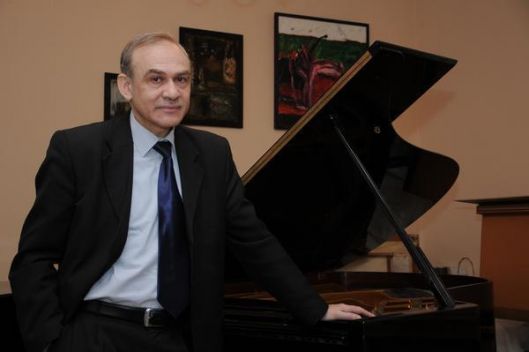About
Born in Edinet, Moldova. Graduated in piano from the Gnesin Musical Pedagogical Institute (now - the Gnesin’s Academy of Music from Russia) in Moscow (1982), and in composition from the “Gavriil Musicescu” State Conservatoire in Chisinau (now – The Academy of Music, Theater and Fine arts) (1986). He has composed works of various genres: opera, musical, symphony, chamber, instrumental music, choral music as well as music for theater and films. His music has been performed at recitals and concerts in Moldova, France, Germany, Greece, Spain, Israel, Denmark, Romania, Russia, Estonia, Ukraine, USA, China, Japan, Italy, Czech Republic, Hungary, Bulgaria, Austria, Netherland, Belgium, Canada, Guatemala, San Salvador and others. His works have been included in the programs of the different international festivals. His works have been recorded and broadcasted by Denmark’s Radio, Copenhagen, Radio Amsterdam, Radio Romania, RAI 1Italy, Great Britain (GBEUR), Czech Republic (CZCR), Portugal (PTRTP), Switzerland (SESR), Croatia (HRHRTR) etc. His works were recorded on CDs.
He is founder and director of "The Days of New Music" International Festival in Chisinau, founder and artistic director of the "Ars poetica" Ensemble of contemporary music.
Ciobanu is PhD, University professor at the Department of Musicology, Composition, Jazz music of the Academy of Music, Theater and Fine Arts in Chisinau.
He holds national and international awards and distinctions, including the Order of the “Star of Romania” in the rank of Commander (2000); National Award of the Republic of Moldova (1998); honorary title Master of Art (1999); the honorary title Doctor Honoris Causa of the Gheorghe Dima Academy of Music in Cluj-Napoca (1997); medal “150 years since the birth of Mihai Eminescu” (Romania, 2000), Order of “Glory of Labor” (Republic of Moldova, 2010); Order “Dimitrie Cantemir”, of the Academy of Sciences of Moldova (2013), Award of the Union of Composers and Musicologists of Romania (2019), Awards of the Union of Composers and Musicologists of the Republic of Moldova.
President of the Union of Composers and Musicologists of Moldova (1990 - 2012), Honorary President of UCMM (since 2012), President of the Association of Contemporary Music of Moldova (since 1993). He has produced the series of radio programs: The Studio of New Music; Continuum: Musical Interferences; Continuum: Stylistic Interferences for the Public company “Teleradio-Moldova”. During 1997 – 2001 he was Minister of Culture of The Republic of Moldova. In the periods 2010 – 2011, 2011 – 2014 he was a Member of Parliament of The Republic of Moldova.
